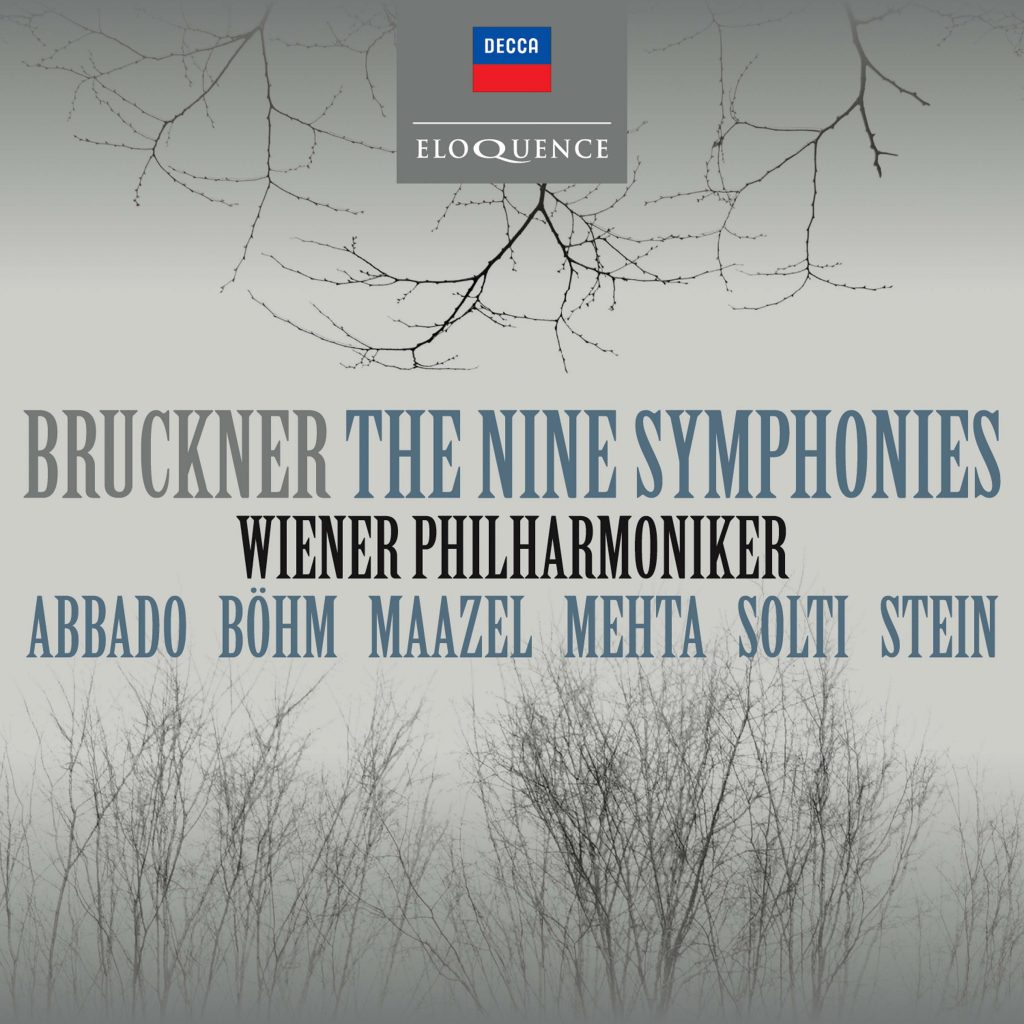The Vienna Philharmonic’s distinguished Bruckner tradition, documented through a series of superb Decca recordings from the 1960s and 70s on a Limited Edition 9-CD box set, with Original Jackets.
Founded in 1842, the Vienna Philharmonic gave a notoriously dusty reception to Bruckner’s Third when they played through it in rehearsal in 1874 and refused to perform it in concert. Three years later the composer conducted them in the premiere of the symphony’s revised version; though the occasion was a fiasco, it earned Bruckner the lifelong admiration of Gustav Mahler, who was present as a student. The orchestra is now proud to present Bruckner’s symphonies all over the world, but No.1 was little known, at least outside Austria and Germany, when the young Claudio Abbado made this incandescent recording in 1969.
The set contains other notable firsts. The earliest recording here is of the Ninth, led in May 1965 by Zubin Mehta. Amazingly this was the conductor’s debut recording, yet it soon won critical praise for the patient build-up of tension, broadly sustained lines and sumptuous playing which are all quintessential attributes of a successful Bruckner performance.
Led by Karl Böhm, the Third and Fourth symphonies have long been recognised as classics of the gramophone, but the ‘Vienna Philharmonic Bruckner cycle’ also contains several less-familiar recordings. There are dynamic accounts of the Second and Sixth led by Horst Stein, who was a Bayreuth regular in the 1970s, and accorded a hero’s welcome on his appearances in Japan, but otherwise known outside German-speaking lands principally for his Decca recordings. The Seventh and Eighth were placed in the dynamic hands of Sir Georg Solti, and his subsequent Chicago Symphony versions have unfairly overshadowed these more flowing, astutely paced Viennese recordings – made by the renowned Decca engineering team of John Culshaw and Gordon Parry.
Usefully packaged with one symphony per disc, in order of the symphony’s numbering, this is a set that no seasoned Brucknerian will want to be without, but it also makes an ideal introduction to the work of Romanticism’s pre-eminent musical mystic.
ANTON BRUCKNER (1824–1896)
The Nine Symphonies
CD 1
Symphony No. 1 in C minor
Claudio Abbado
CD 2
Symphony No. 2 in C minor
Horst Stein
CD 3
Symphony No. 3 in D minor
Karl Böhm
CD 4
Symphony No. 4 in E flat major ‘Romantic’
Karl Böhm
CD 5
Symphony No. 5 in B flat major
Lorin Maazel
CD 6
Symphony No. 6 in A major
Horst Stein
CD 7
Symphony No. 7 in E major
Sir Georg Solti
CD 8
Symphony No. 8 in C minor
Sir Georg Solti
CD 9
Symphony No. 9 in D minor
Zubin Mehta
Wiener Philharmoniker
CD 1
Recording Producer: John Mordler
Balance Engineer: Colin Moorfoot
Recording Location: Sofiensaal, Vienna, Austria, 30 November – 2 December 1969
Original Decca LP Release: SXL 6494 (January 1971)
CD 2
Recording Producer: Michael Woolcock
Balance Engineer: Philip Wade
Recording Location: Sofiensaal, Vienna, Austria, 26–29 November 1973
Original Decca LP Release: SXL 6681 (February 1973)
P & C 1975 Decca Music Group Limited
CD 3
Recording Producer: Christopher Raeburn
Balance Engineers: Gordon Parry, Colin Moorfoot
Recording Location: Sofiensaal, Vienna, Austria, 21–23 September 1970
Original Decca LP Release: SXL 6505 (October 1971)
P & C 1971 Decca Music Group Limited
CD 4
Recording Producer: Michael Woolcock
Balance Engineers: Colin Moorfoot, Jack Law
Recording Location: Sofiensaal, Vienna, Austria, 14–19 November 1973
Original Decca LP Release: 6BB 171–72 (October 1974)
P & C 1974 Decca Music Group Limited
CD 5
Recording Producer: Michael Woolcock
Balance Engineers: Gordon Parry, Jack Law
Recording Location: Sofiensaal, Vienna, Austria, 25–28 March 1974
Original Decca LP Release: SXL 6686–87 (December 1974)
P & C 1974 Decca Music Group Limited
CD 6
Recording Producer: Michael Woolcock
Balance Engineer: Gordon Parry
Recording Location: Sofiensaal, Vienna, Austria, 14–15 November 1972
Original Decca LP Release: SXL 6682 (December 1974)
P & C 1974 Decca Music Group Limited
CD 7
Recording Producer: John Culshaw
Balance Engineer: Gordon Parry
Recording Location: Sofiensaal, Vienna, Austria, 20, 21, 25–28 October 1965
Original Decca LP Release: SET 323–24 (October 1966)
P & C 1966 Decca Music Group Limited
CD 8
Recording Producer: John Culshaw
Recording Engineer: Gordon Parry
Recording Location: Sofiensaal, Vienna, Austria, 24, 28–30 November & 6 December 1966
Original Decca LP Release: SET 335–36 (September 1967)
P & C 1967 Decca Music Group Limited
CD 9
Recording Producer: Erik Smith
Balance Engineer: Gordon Parry
Recording location: Sofiensaal, Vienna, Austria, 3–7 May 1965
Original Decca LP Release: SXL 6202 (January 1966)
P & C 1965 Decca Music Group Limited
‘Elegance, exquisite phrasing, beauty of string tone and lovely wind-playing, bite when needed and a real sense of commitment: all these qualities shine out from every disc.’ Gramophone, December 2014
‘Böhm offers Bruckner as he is played in Vienna today with the Philharmonic showing us how to stretch a singing phrase effortlessly or build one of the composer’s galloping fanfare climaxes up and up to the final peak of intensity.’ High Fidelity, December 1971 (No. 3)
‘A masterful, untroubled and fluent reading, superbly played and excellently recorded.’ Fanfare, Mar/Apr 1983 (No. 4)
‘This Bruckner Sixth always has been the “sleeper” among recorded performances of the work, one of the great ones, yet surprisingly little known. It also presents the Vienna Philharmonic (of 1974) in peak form, almost ideally recorded … If you love Bruckner, particularly as played by the Viennese, you are simply going to adore this.’ Classics Today, February 2005
‘Mehta secures absolutely stunning playing from the Vienna Philharmonic … but it is small discredit to Mehta that he is not yet Furtwängler. No living conductor is. This is a very fine performance.’ High Fidelity, January 1966 (No.9)

